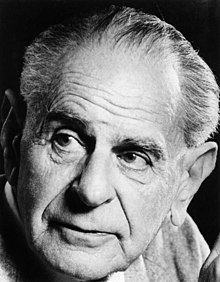Karl Popper
| Sir Karl Popper | |
|---|---|

Karl Popper c. 1980s
|
|
| Born |
Karl Raimund Popper 28 July 1902 Vienna, Austria-Hungary |
| Died | 17 September 1994 (aged 92) London, England, U.K. |
| Nationality | Austrian British |
| Alma mater | University of Vienna |
| Era | 20th-century philosophy |
| Region | Western philosophy |
| School | |
|
Main interests
|
|
|
Notable ideas
|
|
| Karl Popper | |
|---|---|
| Thesis | Zur Methodenfrage der Denkpsychologie (On Questions of Method in the Psychology of Thinking) (1928) |
| Doctoral advisor | Karl Ludwig Bühler |
| Doctoral students | Charles Leonard Hamblin |
Sir Karl Raimund Popper CH FBA FRS (28 July 1902 – 17 September 1994) was an Austrian-British philosopher and professor. He is generally regarded as one of the greatest philosophers of science of the 20th century.
Popper is known for his rejection of the classical inductivist views on the scientific method, in favour of empirical falsification: A theory in the empirical sciences can never be proven, but it can be falsified, meaning that it can and should be scrutinized by decisive experiments. Popper is also known for his opposition to the classical justificationist account of knowledge, which he replaced with critical rationalism, namely "the first non-justificational philosophy of criticism in the history of philosophy."
In political discourse, he is known for his vigorous defence of liberal democracy and the principles of social criticism that he came to believe made a flourishing open society possible. His political philosophy embraces ideas from all major democratic political ideologies and attempts to reconcile them: socialism/social democracy, libertarianism/classical liberalism and conservatism.
Karl Popper was born in Vienna (then in Austria-Hungary) in 1902, to upper middle-class parents. All of Karl Popper's grandparents were Jewish, but the Popper family converted to Lutheranism before Karl was born, and so he received Lutheran baptism. They understood this as part of their cultural assimilation, not as an expression of devout belief. Karl's father Simon Siegmund Carl Popper was a lawyer from Bohemia and a doctor of law at the Vienna University, and mother Jenny Schiff was of Silesian and Hungarian descent. Karl Popper's uncle was the Austrian philosopher Josef Popper-Lynkeus. After establishing themselves in Vienna, the Poppers made a rapid social climb in Viennese society: Simon Siegmund Carl became a partner in the law firm of Vienna's liberal Burgomaster Herr Grübl and, after Grübl's death in 1898, Simon took over the business. (Malachi Hacohen records that Herr Grübl's first name was Raimund, after which Karl received his middle name. Popper himself, in his autobiography, erroneously recalls that Herr Grübl's first name was Carl.) His father was a bibliophile who had 12,000–14,000 volumes in his personal library and took an interest in philosophy, the classics, and social and political issues. Popper inherited both the library and the disposition from him. Later, he would describe the atmosphere of his upbringing as having been "decidedly bookish."
...
Wikipedia
